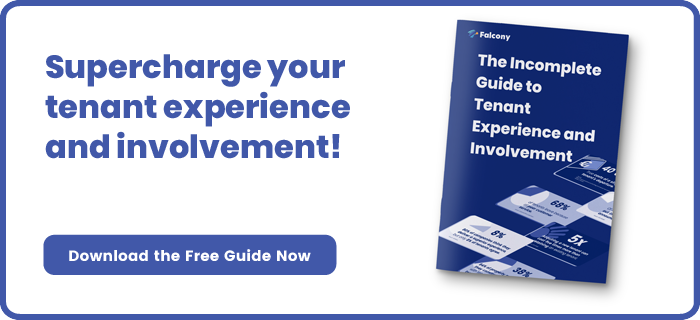What is Experience Management in Commercial Real Estate?
In the rapidly evolving commercial real estate (CRE) sector, the concept of Experience Management (XM) is becoming an essential driver of success.
Traditionally, real estate has been about the physical asset — the buildings, offices, and spaces. However, the shift towards a more tenant-centric approach has brought experience management to the forefront. But what exactly is experience management in commercial real estate, and why does it matter? Let’s explore.
What is Experience Management?
Experience management, in the context of commercial real estate, refers to the process of actively monitoring, measuring, and improving the experience of tenants, visitors, and employees who interact with the properties. It encompasses the creation of environments that support tenant satisfaction, promote employee well-being, and enhance the overall perception of the space. Experience management leverages data and feedback from various stakeholders to inform decisions that influence the design, functionality, and service offerings of a building.
Rather than solely focusing on the physical structure of a property, experience management in CRE takes into account factors such as space layout, amenities, building services, health and safety protocols, technology integration, and the overall atmosphere. It aims to create spaces that foster positive experiences and enhance productivity, involvement, and satisfaction.
Why Does Experience Management Matter?
Tenant Retention and Satisfaction
In today’s competitive real estate market, retaining tenants is crucial. A satisfied tenant is more likely to renew their lease and recommend the space to others. Experience management allows landlords and property managers to identify pain points in the tenant experience and address them proactively. Whether it’s improving the quality of building services, enhancing common areas, or offering flexible working environments, the focus is on creating a space that tenants feel happy and comfortable in.
Attracting and Retaining Talent
For businesses leasing commercial properties, the physical environment plays a pivotal role in attracting and retaining talent. In the wake of the pandemic, employee well-being has become a top priority, and companies are looking for office spaces that prioritise comfort, safety, and convenience. Experience management helps ensure that buildings are equipped with the amenities and features that meet these expectations, such as wellness facilities, collaborative workspaces, and efficient building systems that support employee health.
Branding and Reputation
The reputation of a commercial property is significantly influenced by the experience it offers. A well-managed space, where tenants feel valued and supported, enhances the building’s brand and strengthens its position in the market. Experience management allows real estate owners and developers to create positive associations with their properties, which in turn elevates their brand image and sets them apart from the competition.
Increased Operational Efficiency
A focus on experience management also benefits the operational side of commercial real estate. By gathering and analysing feedback from tenants and building users, property managers can identify inefficiencies in service delivery and find solutions to improve performance. For example, integrating smart building technology can enhance energy efficiency, streamline maintenance processes, and improve the overall functionality of the building. These operational improvements not only create a better experience for tenants but also reduce costs in the long term.
Data-Driven Decision Making
One of the core components of experience management is the collection and analysis of data. By using surveys, IoT devices, and other feedback channels, property managers can gather insights into how tenants use spaces, what they value most, and where improvements are needed. This data-driven approach enables real estate owners to make informed decisions about how to invest in their properties and optimise the tenant experience. Over time, this leads to a more effective management strategy and ensures that the building meets the evolving needs of its occupants.
The Future of Experience Management in CRE
As the expectations of tenants and employees continue to evolve, the importance of experience management in commercial real estate is set to increase. New technologies such as AI and IoT will play a key role in providing real-time data and enhancing the efficiency of experience management strategies. Additionally, with sustainability becoming a growing concern, experience management will increasingly intersect with green building practices and ESG (Environmental, Social, and Governance) goals, ensuring that the tenant experience aligns with broader societal values.
Ultimately, experience management is not just about enhancing the physical space but about fostering a culture of care and involvement that benefits both property owners and occupants. In a world where customer experience is everything, it’s clear that experience management is not just a trend — it’s the future of commercial real estate.
By prioritising the experience of tenants, businesses in the CRE sector can gain a competitive edge, drive long-term success, and create spaces that are more than just buildings — but thriving, dynamic environments for work and collaboration.
Conclusion
In today’s commercial real estate landscape, experience management is a strategic approach that can make a significant difference in tenant retention, operational efficiency, and brand reputation. By focusing on the human experience — from the amenities offered to the building’s overall atmosphere — landlords and property managers can create spaces that truly meet the needs of modern tenants. Experience management is no longer a luxury but a necessity for businesses that want to thrive in an increasingly competitive and tenant-centric market.
If your organisation is looking for a 360° tenant experience tool to involve all employees, service providers and tenants to improve the quality of your operations, have a look at the 30-day free trial of Falcony | Tenant Portal:
We are building the world's first operational involvement platform. Our mission is to make the process of finding, sharing, fixing and learning from issues and observations as easy as thinking about them and as rewarding as being remembered for them.
By doing this, we are making work more meaningful for all parties involved.
More information at falcony.i

Related posts
How to Create a Successful Tenant Involvement Strategy in Commercial Real Estate?
In commercial real estate, fostering a sense of community and engagement among tenants is essential...
The Impact of Smart Building Solutions on Tenant Satisfaction
The rapid advancement of technology has transformed the commercial real estate industry.
Smart...
The Power of Virtual Reality in Commercial Tenant Experience
Virtual Reality (VR) technology has made significant strides in recent years, transforming...






